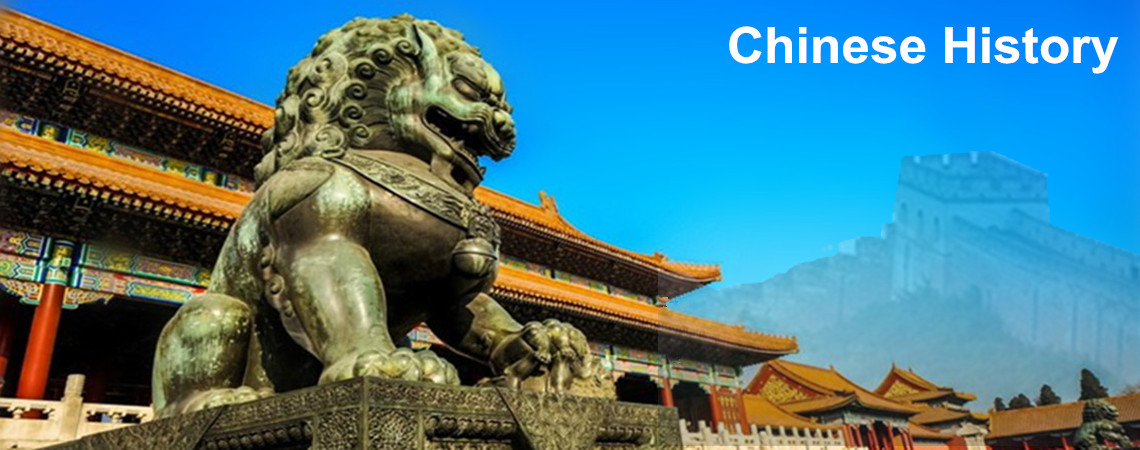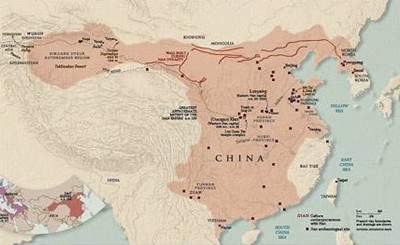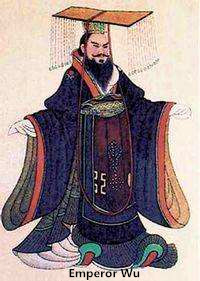
Western Han Dynasty (206BC-24AD )
 207BC). Liu Bang recruited people based on their ability not birth or wealth, and his government included many former serfs and commoners. The capital city was named Chang'an (present day Xian). The dynasty based on a series of political and economic reforms, was ruled by 12 emperors in succession enjoying peace and prosperity.The Western Han Dynasty (206BC - 24AD) was regarded as the first unified and powerful empire in Chinese history.
207BC). Liu Bang recruited people based on their ability not birth or wealth, and his government included many former serfs and commoners. The capital city was named Chang'an (present day Xian). The dynasty based on a series of political and economic reforms, was ruled by 12 emperors in succession enjoying peace and prosperity.The Western Han Dynasty (206BC - 24AD) was regarded as the first unified and powerful empire in Chinese history.Facts of Western Han
Time: 206B.C.-24 A.D.
Location of Capital: Chang'an, in today's Xian City
Emperors: Han Gaozu,Wendi, Jingdi
Replaced by: Eastern Han Dynasty
Brief Introduction to Western Han Dynasty
Liu Bang's Reforms
The first emperor, Liu Bang, Emperor Gaozu initiated many effective measures by recruiting people for his government based on their ability, not birth or wealth, and drawing lessons from the collapse of the Qin and former dynasties. The economy recovered very quickly with able people in the government and with policies based on Lui Bang's reforms. The arts were encouraged by Gaozu and flourished.
After Gaozu's death, his son Liu Ying succeeded to the throne although power was held by his mother Queen Lv Zhi. After 16 years of reign by Lv Zhi, Liu Heng (Emperor Wen) and Liu Qi (Emperor Jing) became the emperors in succession. They both reduced the people's tax burdens as Emperor Gaozu had done and encouraged the people to farm and be thrifty in life. Due to their effective measures, the people lived in stability and the nation's wealth and power were enhanced greatly.
Emperor Wu, Liu Che
 During the reign of Emperor Wu, Liu Che who ruled from 141 - 87 BC, the Han Dynasty achieved its most powerful and prosperous period.
During the reign of Emperor Wu, Liu Che who ruled from 141 - 87 BC, the Han Dynasty achieved its most powerful and prosperous period.
1. He dispatched two generals Wei Qing and Huo Qubing to fight against the invasion of the Hun (an ancient tribe that lived in the north part of China) and greatly enlarged the territory of the Western Han.
2. Emperor Wu's wars assured safe trade routes and the establishment of the great Silk Road. Emperor Wu also sent emissaries and trade missions to many countries and established foreign trade.
3. In his later years, through encouraging the development of agriculture, the economy developed quickly.
4. Emperor Wu also changed the official state religion from Taoism to Confucianism.
The eventual decline of the dynasty also began with Emperor Wu's policy of selling land to private landholders that would result in great inequality, raising taxes on the poor working people causing many people to be displaced and become serfs.
Late of the Western Han Dynasty
The dynasty passed its zenith under Emperor Zhao and Emperor Xuan who followed and Emperor Yuan (73 BC - 33 BC) began to lose the power to deal with the state affaires; going against the principle of promoting people based on ability, he had chosen prominent Confucians who relied on astronomy and fortune telling to fill government positions and as advisors.
Wang Mang changed the name of dynasty to Xin (9 - 23AD)
The Western Han ended with Liu Ying and the country in revolution. Wang Mang seized the imperial throne (9 - 23) and changed the name of dynasty to Xin. However, after a series of protests the social rebellion became so serious that the rule of Wang Mang was overthrown by an uprising of peasants.
Liu Xiu reestablished the Han Dynasty in 25 AD
This uprising was suppressed by Liu Xiu, (a royal of the Han) who was trusted by the people. In 25, Liu Xiu reestablished the Han Dynasty (now called Eastern Han) and made Luo Yang the capital city.







 Ask Questions ?
Ask Questions ?